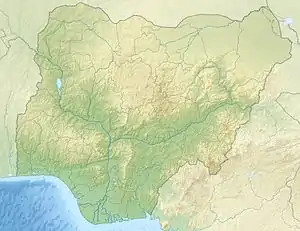| Akure Ofosu Forest Reserve | |
|---|---|
IUCN category V (protected landscape/seascape) | |
 Map of Nigeria | |
| Location | Ondo State, Nigeria |
| Nearest city | Akure |
| Coordinates | 6°57′47″N 5°21′14″E / 6.963°N 5.354°E[1] |
| Area | 394 km2 (152 sq mi) |
The Akure Forest Reserve is situated in Ondo State, Nigeria's Akure South Local Government Area, a tropical rainforest. It has a total area of approximately 40,000 hectares (99,000 acres)[lower-alpha 1] and is located between latitudes 7°16' and 7°18' N and longitudes 5°9' and 5°11' E.[4]
Akure Ofosu is of great importance for the conservation of the chimpanzee population in Nigeria. Research conducted during 2007 found 33 nests at four locations, without direct vision.[5]
History
Established in 1936 and comprising some 400 square kilometers (154 square miles), Akure-Ofosu Forest Reserve also borders the Ala, Owo, and Ohosu altogether forming one of the largest areas of forest remaining in Nigeria. The forests contained within, are home to many different species, including threatened primates. Red-capped mangabeys (Cercocebus torquatus), Nigerian white-throated guenons (Cercopithecus erythrogaster pococki), putty-nosed monkeys (Cercopithecus nictitans), mona monkeys (Cercopithecus mona), and others can all be found in what remains of Akure-Ofosu’s forests. [6]
Southwest Nigeria and the Niger Delta are priority areas for chimpanzee surveys, according to the Regional Action Plan for the Conservation of Chimpanzees in West Africa.[7] The discussions from a workshop on the conservation of West African chimpanzees conducted in Abidjan, Cote d'Ivoire in September 2002 served as the foundation for that regional plan. Chimpanzee populations in western Nigeria were poorly understood, considered to be seriously threatened, and in need of a conservation strategy.
Economic benefit
In Akure Ofosu forest reserve, the woods serve as the source of raw materials for numerous industries, promote job creation, improve the quality of the environment, and greatly contribute to food production.[8] Forestry is necessary for the residents of the forest reserves to maintain a sustainable standard of living. Akure Ofosu Forest Reserve is known to produce a wide range of non-timber forest products, including chewing sticks, fruits, nuts, honey, fuel wood, and leaves.
Elujulo et al.[9] have suggested that the loss of forestland in this and other Nigerian reserves may be due to the populations resident within the preserves who need to convert preserve land to crop farming. Current forestry management strategies that restrict accessibility to the preserves have been identified as a major driver of household poverty within the forest communities.
Notes
References
- ↑ "Akure Ofosu Forest Reserve". protectedplanet.net. Archived from the original on 2012-09-24.
- ↑ Ikemeh, Rachel Ashegbofe (2018). "Sustainable forest management in a human dominated landscape and its implications for biodiversity conservation: a Nigerian lowland forest perspective". Research and Reports in Biodiversity Studies. 9 (23). doi:10.2147/RRBS.S35442.
- ↑ Sunday, Orji (24 July 2023). "Poverty-fueled deforestation of Nigerian reserve slashes hope for rare chimps". Mongabay.
- ↑ Elujulo, O.; Adetula, O. I.; Akinbowale, S. A.; Adelola, T. R. (2023-01-31). "Dependence on Forest Resources, and Community Perception of Existing Management Strategies of Akure-Ofosu, Oluwa, and Akure Forest Reserves in Southwest Nigeria". Journal of Applied Sciences and Environmental Management. 27 (1): 17–23. doi:10.4314/jasem.v27i1.4. ISSN 2659-1502.
- ↑ Ogunjemite, B. G.; Oates, J. F. (2011). "Assessment of the Chimpanzee Populations in Akure-Ofosu Forest Reserve, Southwestern Nigeria". Journal of Research in Forestry, Wildlife and Environment. 3 (2): 32–38. ISSN 2141-1778.
- ↑ "Takeover of Nigerian reserve highlights uphill battle to save forests". Mongabay Environmental News. 2020-05-04. Retrieved 2022-09-09.
- ↑ Kormos, R. & Boesch, C. (2003). Regional Action Plan for the Conservation of Chimpanzees in West Africa. Conservation International, Washington, D.C.
- ↑ Adeyoju, S. K. (1981). Our forest and welfare: Inaugural lecture, University of Ibadan 11.
- ↑ Elujulo, O.; Adetula, O. I.; Akinbowale, S. A.; Adelola, T. R. (17 January 2023). "Dependence on Forest Resources, and Community Perception of Existing Management Strategies of Akure-Ofosu, Oluwa, and Akure Forest Reserves in Southwest Nigeria". Journal of Applied Sciences and Environmental Management. 27 (1): 17–23. doi:10.4314/jasem.v27i1.4. S2CID 256761048.